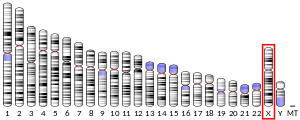AP1S2
AP-1 complex subunit sigma-2 is a protein that in humans is encoded by the AP1S2 gene.[5][6][7]
Function
Adaptor protein complex 1 is found at the cytoplasmic face of coated vesicles located at the Golgi complex, where it mediates both the recruitment of clathrin to the membrane and the recognition of sorting signals within the cytosolic tails of transmembrane receptors. This complex is a heterotetramer composed of two large, one medium, and one small adaptin subunit. The protein encoded by this gene serves as the small subunit of this complex and is a member of the adaptin protein family. Transcript variants utilizing alternative polyadenylation signals exist for this gene.[7]
Pathology
Mutations of the AP1S2 gene cause the Pettigrew syndrome,[8] which is characterized by mental retardation and additional highly variable features, including choreoathetosis, hydrocephalus, Dandy-Walker malformation, seizures, and iron or calcium deposition in the brain.[9]
References
- GRCh38: Ensembl release 89: ENSG00000182287 - Ensembl, May 2017
- GRCm38: Ensembl release 89: ENSMUSG00000031367 - Ensembl, May 2017
- "Human PubMed Reference:". National Center for Biotechnology Information, U.S. National Library of Medicine.
- "Mouse PubMed Reference:". National Center for Biotechnology Information, U.S. National Library of Medicine.
- Takatsu H, Sakurai M, Shin HW, Murakami K, Nakayama K (September 1998). "Identification and characterization of novel clathrin adaptor-related proteins". The Journal of Biological Chemistry. 273 (38): 24693–700. doi:10.1074/jbc.273.38.24693. PMID 9733768.
- Tarpey PS, Stevens C, Teague J, Edkins S, O'Meara S, Avis T, et al. (December 2006). "Mutations in the gene encoding the Sigma 2 subunit of the adaptor protein 1 complex, AP1S2, cause X-linked mental retardation". American Journal of Human Genetics. 79 (6): 1119–24. doi:10.1086/510137. PMC 1698718. PMID 17186471.
- "Entrez Gene: AP1S2 adaptor-related protein complex 1, sigma 2 subunit".
- Huo L, Teng Z, Wang H, Liu X (March 2019). "A novel splice site mutation in AP1S2 gene for X-linked mental retardation in a Chinese pedigree and literature review". Brain and Behavior. 9 (3): e01221. doi:10.1002/brb3.1221. PMC 6422709. PMID 30714330.
- "Pettigrew syndrome". Universal Protein Resource (UniProt).
External links
- Human AP1S2 genome location and AP1S2 gene details page in the UCSC Genome Browser.
Further reading
- Kirchhausen T (2000). "Clathrin". Annual Review of Biochemistry. 69: 699–727. doi:10.1146/annurev.biochem.69.1.699. PMID 10966473.
- Geyer M, Fackler OT, Peterlin BM (July 2001). "Structure--function relationships in HIV-1 Nef". EMBO Reports. 2 (7): 580–5. doi:10.1093/embo-reports/kve141. PMC 1083955. PMID 11463741.
- Bénichou S, Benmerah A (January 2003). "[The HIV nef and the Kaposi-sarcoma-associated virus K3/K5 proteins: "parasites"of the endocytosis pathway]". Médecine/Sciences. 19 (1): 100–6. doi:10.1051/medsci/2003191100. PMID 12836198.
- Kirchhausen T, Davis AC, Frucht S, Greco BO, Payne GS, Tubb B (June 1991). "AP17 and AP19, the mammalian small chains of the clathrin-associated protein complexes show homology to Yap17p, their putative homolog in yeast". The Journal of Biological Chemistry. 266 (17): 11153–7. PMID 2040623.
- Craig HM, Pandori MW, Guatelli JC (September 1998). "Interaction of HIV-1 Nef with the cellular dileucine-based sorting pathway is required for CD4 down-regulation and optimal viral infectivity". Proceedings of the National Academy of Sciences of the United States of America. 95 (19): 11229–34. Bibcode:1998PNAS...9511229C. doi:10.1073/pnas.95.19.11229. PMC 21624. PMID 9736718.
- Bresnahan PA, Yonemoto W, Ferrell S, Williams-Herman D, Geleziunas R, Greene WC (November 1998). "A dileucine motif in HIV-1 Nef acts as an internalization signal for CD4 downregulation and binds the AP-1 clathrin adaptor". Current Biology. 8 (22): 1235–8. doi:10.1016/S0960-9822(07)00517-9. PMID 9811606.
- Greenberg M, DeTulleo L, Rapoport I, Skowronski J, Kirchhausen T (November 1998). "A dileucine motif in HIV-1 Nef is essential for sorting into clathrin-coated pits and for downregulation of CD4". Current Biology. 8 (22): 1239–42. doi:10.1016/S0960-9822(07)00518-0. PMID 9811611.
- Berlioz-Torrent C, Shacklett BL, Erdtmann L, Delamarre L, Bouchaert I, Sonigo P, et al. (February 1999). "Interactions of the cytoplasmic domains of human and simian retroviral transmembrane proteins with components of the clathrin adaptor complexes modulate intracellular and cell surface expression of envelope glycoproteins". Journal of Virology. 73 (2): 1350–61. doi:10.1128/JVI.73.2.1350-1361.1999. PMC 103959. PMID 9882340.
- Wyss S, Berlioz-Torrent C, Boge M, Blot G, Höning S, Benarous R, Thali M (March 2001). "The highly conserved C-terminal dileucine motif in the cytosolic domain of the human immunodeficiency virus type 1 envelope glycoprotein is critical for its association with the AP-1 clathrin adaptor [correction of adapter]". Journal of Virology. 75 (6): 2982–92. doi:10.1128/JVI.75.6.2982-2992.2001. PMC 115924. PMID 11222723.
- Doray B, Ghosh P, Griffith J, Geuze HJ, Kornfeld S (September 2002). "Cooperation of GGAs and AP-1 in packaging MPRs at the trans-Golgi network". Science. 297 (5587): 1700–3. Bibcode:2002Sci...297.1700D. doi:10.1126/science.1075327. PMID 12215646.
- Janvier K, Craig H, Hitchin D, Madrid R, Sol-Foulon N, Renault L, et al. (March 2003). "HIV-1 Nef stabilizes the association of adaptor protein complexes with membranes". The Journal of Biological Chemistry. 278 (10): 8725–32. doi:10.1074/jbc.M210115200. PMID 12486136.
- Coleman SH, Van Damme N, Day JR, Noviello CM, Hitchin D, Madrid R, et al. (February 2005). "Leucine-specific, functional interactions between human immunodeficiency virus type 1 Nef and adaptor protein complexes". Journal of Virology. 79 (4): 2066–78. doi:10.1128/JVI.79.4.2066-2078.2005. PMC 546596. PMID 15681409.
- Rual JF, Venkatesan K, Hao T, Hirozane-Kishikawa T, Dricot A, Li N, et al. (October 2005). "Towards a proteome-scale map of the human protein-protein interaction network". Nature. 437 (7062): 1173–8. Bibcode:2005Natur.437.1173R. doi:10.1038/nature04209. PMID 16189514.
- Coleman SH, Hitchin D, Noviello CM, Guatelli JC (February 2006). "HIV-1 Nef stabilizes AP-1 on membranes without inducing ARF1-independent de novo attachment". Virology. 345 (1): 148–55. doi:10.1016/j.virol.2005.09.045. PMID 16253302.



